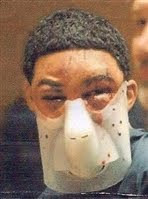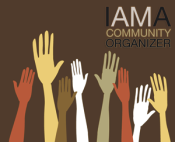I read an e-mail recently that pointed out with great specificity the problems that Blacks are having with police and the criminal justice system in one geographical area, but that then proposed the following as causes leading to potential solutions:
The problem within the xxxyzzz Police Department:
1. Poor recruitment
2. Poor training
3. Poor Supervision
I wrote back with the following opinion, which I've embellished with citations and statistics below:
I believe the police are doing exactly what they are trained to do, which is to occupy the Black community and keep it under a state of siege. When police learn to profile based on skin color during their training courses, they are receiving "training" to suspect, beat, arrest and imprison Black people disproportionately. If this is what you mean when you say "poor training" then I agree with you.
Supervisors in police departments almost always support police officers who have committed even the most savage and unconscionable acts under color of law. If by "poor supervision" you mean that supervisors encourage officers to target Blacks, then I agree with you that "poor supervision" is a problem.
When police departments recruit police officers, they recruit people whom they believe will behave consistent with the above policies of color-aroused injustice. Police know what their job is in the Black community and with respects to Blacks who are in a white community or institution: arrest and convict enough Black people to maintain one million Blacks in jail and prison, which has the highest imprisonment rates of any country on Earth, by far.

The
New York Times says:
The United States has, for instance, 2.3 million criminals behind bars, more than any other nation, according to data maintained by the International Center for Prison Studies at King's College London.
China, which is four times more populous than the United States, is a distant second, with 1.6 million people in prison. (That number excludes hundreds of thousands of people held in administrative detention, most of them in China's extrajudicial system of re-education through labor, which often singles out political activists who have not committed crimes.)
( . . . )
The United States comes in first, too, on a more meaningful list from the prison studies center, the one ranked in order of the incarceration rates. It has 751 people in prison or jail for every 100,000 in population. (If you count only adults, one in 100 Americans is locked up.)
Black people compose and bear the brunt of this massive incarceration.
The National Council on Crime and Delinquency says:
US rates are in large part driven by disproportionate minority incarceration.
In the US, African Americans are over six times as likely to be incarcerated as whites; Latinos over twice as likely. If the US enacted the reforms necessary to reduce its disproportionate minority confinement by just 50%, the incarceration rate would drop to approximately 491 and put the US fifth in the world instead of first (see Harrison & Beck, 2006 and US Census Bureau, 2006a).
For example, according to
PrisonPolicy.Org.:
In Delaware, Blacks represent:
§ 20% of the general population;
§ 42% of those arrested for criminal offenses;
§ 64% of the prison population; and
§ 86.8% of those incarcerated for drug offenses.
This is not, as many assume, attributable to a higher incidence of criminal behavior among Blacks. The national data shows that Non-whites are statistically more likely to be imprisoned because they are more likely to be arrested than Whites. Much of this appears to be attributable to the “war on drugs.” Studies have consistently shown that Whites use drugs at rates comparable to Blacks, which makes them the vast majority of illicit drug users.
White drug dealers far outnumber Black dealers. Yet, of those incarcerated for drug charges in Delaware, Blacks represent 86.8 percent of those sentenced to prison terms for drug offenses.
This trend is seen in most if not all states. According to a report by
RacialDisparity.Org, concerning the state of Minnesota:
The racial disparity in the justice system originates predominantly at the point of first contact with law enforcement. Depending on the level and type of crime, the disparity may increase, remain roughly the same, or in some cases decrease as the case moves through the justice system; however, this change is typically not significant when compared to the disparity that occurs at arrest.
This point of first contact can occur through police response to 911 calls or through more discretionary activities such as traffic stops, police contact in the community (e.g. for loitering, lurking), or in the case of juveniles, through interactions with school administration (e.g. for disorderly conduct). Studies from across the country have shown that a disproportionate number of African Americans are routinely stopped and searched while driving4. This finding holds true in Minnesota.
Here, law enforcement officers stop Black, Latino, and American Indian drivers all at a greater rate than White drivers; search Blacks, Latinos and American Indians all at a greater rate than White drivers; and find contraband as a result of searches of Blacks, Latinos, and American Indians all at a rate lower than in searches of White drivers. African Americans drivers, for example, are stopped at a rate 3.5 times higher than Whites; searched at a rate 3.4 times higher, yet have contraband found on their person or in their car only half as often as Whites (Council: Racial Profiling, 2003).
The racial disparity at point of first contact carries over into arrests. A Council study found that for every 100,000 people in each racial group, the arrest rate was 4,138 for African Americans, 1,277 for American Indians, 188 for Asians, and 404 for Whites. The racial disparity (i.e. the ratio of arrest rates) for African American to White was 10:1; for Latinos to White 4:1; and
Nationally, the disparity for African Americans and Whites was 4: 1; which
means that the arrest rate disparity in Minnesota is more than twice the national average. The racial disparity is larger for low level offenses where police officer discretion is the greatest. In 2001, the equivalent of one out of four Black residents of Minneapolis were either arrested or cited for such low-level offenses as disorderly conduct, loitering or lurking. For Whites, the number was one in sixty, yielding a disparity of fifteen to one (Council: Low Level Offense, 2004).
The racial disparity in low level offense arrests is also true for juveniles. In Minneapolis, African American juveniles are at least four times more likely to be cited or booked for loitering than White juveniles. In Brooklyn Center, African American juveniles represent 20 percent of the population, yet are 65 percent of those who are either cited or arrested (Council: Disproportionate Minority Contact II, 2006).
The above is not evidence of lack of "poor training" or "poor supervision." It is evidence of systematic and blatantly obvious color-aroused policing patterns that are apparent to anyone who visits a jail in a majority white state (all states).
Overall, this problem is not one of negligence, but rather one of a white nation intentionally focusing on Black communities for more violent, more stringent and more punitive treatment. When we complain, police departments and politicians assure us that better training, supervision and recruitment could reverse these realities. We buy into this story that says that police abuses are not intentional but are negligent results of lapses. The truth is that police abuse of Blacks is no more negligent (accidental and unintended) than Klu Klux Klan rallies and lynchings. What they do is intentional and based on a clear understanding of the injustice rather than an ignorance of it.
The police represent American society's worst attitudes about Blacks. Training police not to abuse Blacks is like training tigers not to attack rabbits and to be vegetarians instead. Good luck! What we need is political change with respect to the fact and results of color-arousal in the United States and elsewhere.
I believe this is why the Black Panther Party focused on "revolution" as the solution, even though it was hard to imagine how a small Black minority of the American population could take control of the Government and change its policing and incarceration behavior. It was clear to the Black Panthers that minor retouches to a fundamentally color-aroused (in)justice system, in a profoundly color-aroused incarceration society, would be insufficient and mostly meaningless in terms of addressing and redressing the blatant and rampant discrimination against, subjugation and imprisonment of Blacks by "the system."
The incarceration rate in the United States is
almost five times that of Brazil, a nation that is 50% Black, which is why I think I'll just stay in Brazil.







